Present Perfect Vs Present Perfect Continuous Worksheets With Answers
Present Perfect Continuous ESL Activities, Games and Worksheets
- Intermediate (B1)
- Upper-intermediate (B2)
A Perfect Review!
ESL Present Perfect Continuous Worksheet - Grammar Exercises: Matching, Binary Choice, Sentence Completion, Writing Sentences from Prompts - Intermediate (B1) - 30 minutes
In this present perfect continuous worksheet, students review the uses of the present perfect continuous tense and identify how it is different from the present perfect simple. Students start by matching sentence halves together to make present perfect continuous sentences. Next, students read a set of sentences and underline the correct perfect tense in each one. Students then complete a grammar explanation on the difference between the present perfect simple and the present perfect continuous based on what they've learned. After that, students use verbs from a box to write present perfect continuous sentences to explain the present conditions expressed in the prompts. Finally, students use prompts to write what each person usually does versus what they have been doing recently. In this exercise, students practice using the present perfect continuous to express a recent or temporary change in someone's routine.
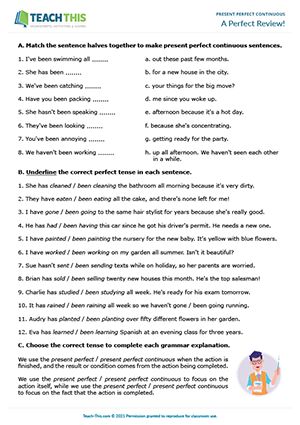

Have you been...?
ESL Present Perfect Continuous Activity - Grammar and Speaking: Writing Short Answers, Asking and Answering Questions, Explaining, Freer and Communicative Practice - Pair Work - Intermediate (B1) - 30 minutes
In this present perfect continuous speaking activity, students practice asking and answering Have you been questions. Students begin by writing short answers for the items on the worksheet in a random order in speech bubbles. Next, students swap worksheets with a partner. Students then take it in turns to choose an answer from one of their partner's speech bubbles and ask present perfect continuous Have you been...? questions to find out what the answer refers to. For example, if a student wrote the answer 'seven o'clock' in one of the speech bubbles, their partner might ask 'Have you been waking up at seven o'clock recently?' The student replies 'Yes, I have' or 'No, I haven't' accordingly. When a partner asks the right question, the student explains their answer, e.g. 'Yes, I have. I've been waking up at seven o'clock because I go jogging in the park before school, etc...' After the student has explained the answer and it's been discussed, their partner puts a tick next to the bubble and the students swap roles.
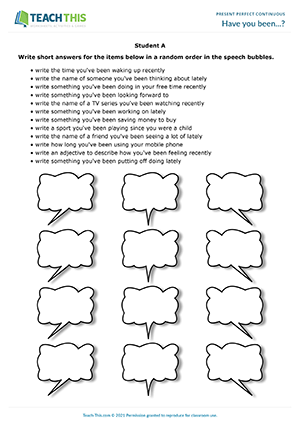

What have you been doing recently?
ESL Present Perfect Continuous Survey - Speaking Activity: Asking and Answering Questions from Prompts, Freer Practice - Intermediate (B1) - 30 minutes
In this present perfect continuous activity, students conduct a survey on recent activities and actions to practice the tense. This activity also helps to teach students about time expressions used with the present perfect continuous. Students begin by going through the items on the worksheet and preparing present perfect continuous questions for the survey. Students then move around the classroom asking and answering questions about their recent activities and actions, e.g. 'Have you been working hard recently?' When a classmate answers 'Yes, I have' to a question, the other student writes down their name and asks a follow-up question or two. Students then move on to speak to someone else. When everyone has finished, students give feedback by sharing and discussing any interesting findings with the class.
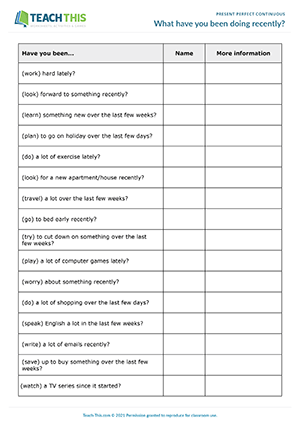

What have I been doing?
ESL Present Perfect Continuous Game - Grammar and Speaking: Miming, Guessing, Forming Sentences - Group Work - Intermediate (B1) - 30 minutes
In this free present perfect continuous game, students take it in turns to do a mime and other students guess what the person has been doing. A student from Team A comes to the front of the class. The student asks the class, "What have I been doing?" The student then has two minutes to mime a sentence on a card to their team. During these two minutes, the members of Team A can ask the student questions about what they have been doing to which the student can nod yes or no. If Team A guesses the sentence in the allotted time, they score two points. If they don't guess the sentence or time runs out, it is Team B's turn to answer. If Team B guesses correctly, they score one point. A student from Team B then comes to the front of the class and the game continues in the same way. The team with the most points at the end of the game wins.
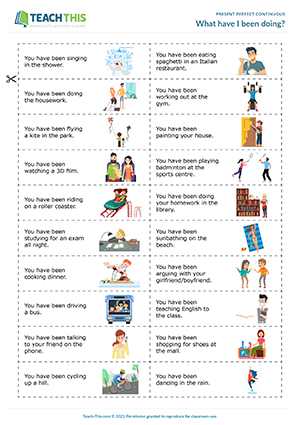

What have they been doing?
ESL Present Perfect Continuous Activity - Grammar and Speaking: Asking and Answering Questions, Forming Sentences - Pair Work - Intermediate (B1) - 20 minutes
In this engaging present perfect continuous speaking activity, students use picture cards to ask and answer questions in the present perfect continuous tense. Students take it in turns to pick up a picture card, show it to their partner and ask what the person or people in the picture have been doing, e.g. 'What has he been doing?' Their partner then answers the question by making a sentence in the present perfect continuous, e.g. 'He has been reading a book.' Students continue taking it in turns to ask and answer questions in the present perfect continuous until all the picture cards have been used.
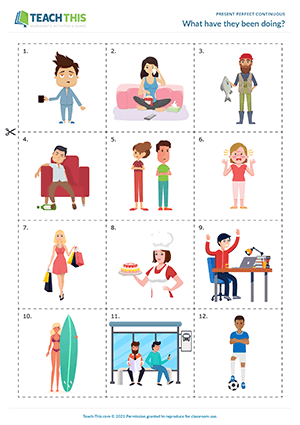

Are you lying to me?
ESL Present Perfect Continuous Board Game - Speaking and Grammar: True or False, Impromptu Speech, Guessing, Communicative Practice - Group Work - Upper-intermediate (B2) - 30 minutes
In this fun present perfect continuous board game, students give true or false information about themselves using the present perfect continuous tense. Players take it in turns to roll the dice and move their counter along the board. When a player lands on a square, they pick up a true or false card. The player then talks about the topic on the square using the present perfect continuous tense, giving either true or false information as indicated on the card. When the player has finished talking, the other students guess whether the player's answer is true or false. The player then reveals the answer. The students who guessed correctly each score one point. When a player reaches the finish, the game ends and students add up their points. The student with the most points wins the game.
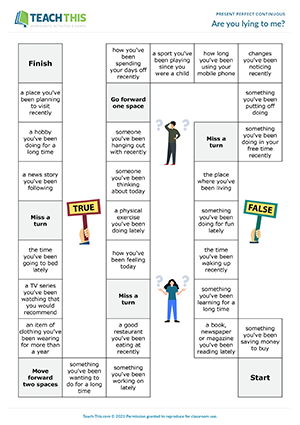

Early Release
ESL Present Perfect Continuous Activity - Grammar and Speaking: Information Gap, Asking and Answering Questions, Discussion, Freer and Communicative Practice - Pair Work - Upper-intermediate (B2) - 20 minutes
In this present perfect continuous information gap activity, students find out what useful acts prisoners have been doing and decide who should be released early. Read through the prison scenario with the students. In two groups, students then complete sentences describing the useful things the prisoners have been doing using verbs in the present perfect continuous, e.g. 'Gino has been cutting the prison lawns six times a week'. Next, students pair up with someone from the other group. Students then complete the missing information in their chart by asking their partner present perfect continuous questions to find out what useful acts the other prisoners have been doing, e.g. 'What has Pablo been doing?' When both students have completed the chart, they decide which prisoner they think deserves to be released early.
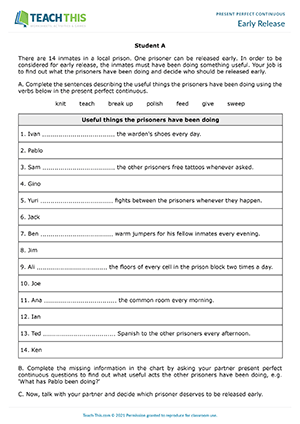

What do you think they have been doing?
ESL Present Perfect Continuous Role-Play - Grammar and Speaking Activity: Asking and Answering Questions, Sentence Completion, Controlled Practice - Group Work - Upper-intermediate (B2) - 25 minutes
In this present perfect continuous activity, students take on a character role and ask questions to find out what other people have been doing. In groups, students take on the role of the person on their character card and find out what the other people in their group have been doing by asking questions and completing a chart with the information. In order to complete the chart, students must use the present perfect continuous and ask a total of four questions. Students go around their group asking and answering the questions and noting down the information in their chart. When the students have finished, they look at the information and guess what each person has been doing. Students then complete sentences with their answers using the present perfect continuous.
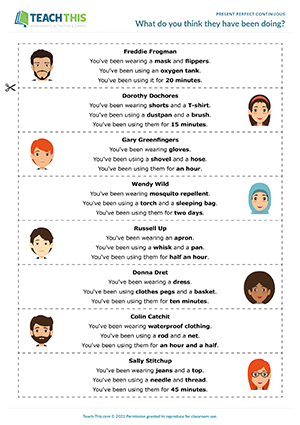

What have you been up to?
ESL Present Perfect Continuous Activity - Grammar and Speaking: Asking and Answering Questions from Prompts, Small Talk, Communicative Practice - Pair Work - Upper-intermediate (B2) - 30 minutes
This present perfect continuous speaking activity helps students develop their small talk conversation skills and practice the present perfect continuous tense. In pairs, one student starts the conversation by saying 'Hi..., what have you been up to?' The other student then picks up a card, reads the prompt and replies using the present perfect continuous, e.g. 'I've been busy searching for a new apartment'. The other student then shows interest and asks appropriate follow-up questions to keep the conversation going. When the conversation is over, students swap roles and make a new conversation with the next card and so on. Afterwards, pairs take it in turns to act out one of their small talk conversations in front of the class.
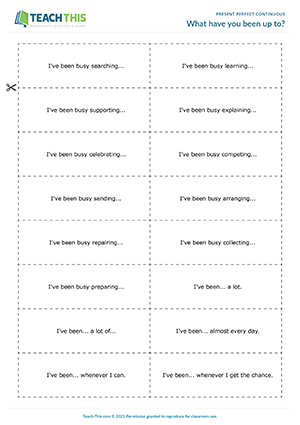

Source: https://www.teach-this.com/grammar-activities-worksheets/present-perfect-continuous
0 Response to "Present Perfect Vs Present Perfect Continuous Worksheets With Answers"
Post a Comment